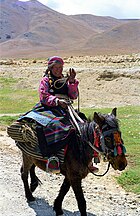Tashi delek (also written zhaxi dele, tashi deleg, tashi deley, or trashi delek; Tibetan: བཀྲ་ཤིས་བདེ་ལེགས, Wylie: bkra shis bde legs, Lhasa dialect IPA: [[ʈáɕiʔ dèleʔ]]) is a Tibetan greeting.
Origin and meaning
Tashi means auspicious and Delek (or Deleg, Deleh) means fine or well.[1] It is difficult and perhaps impossible to translate properly into English.[2] Different authors render it as "Blessings and good luck" or "May all auspicious signs come to this environment".[3][4]
Usage
The correct usage of the phrase "Tashi Delek" can be a point of contention between Tibetans in and outside of China. Tibetans outside of China use it in approximately the same way as the English "Good day", whereas Tibetans in China use it only for New Year's greetings. Each claims the other side's use has been corrupted.[5]. However, Tibetans all over the Tibetan Plateau respond positively to tourists using it year round and also might greet Westerners with 'Tashi Delek'.
The phrase "Tashi delek" is also used in the Chinese language with the Chinese transcription Zhaxi Dele (扎西德勒).[6] Most Chinese only know the Chinese transcription of the phrase, not its Roman alphabet transcription.[citation needed] There is a song called Zhaxi Dele with lyrics by Rongzhong Erjia (容中尔甲), a Tibetan, and music by Chang Yingzhong (昌英中), a Han Chinese.[7]
The phrase is also used in Nepal, Bhutan and Sikkim. There is a company in Bhutan called TashiDelek.com[8] and a Hotel Tashi Delek in Gangtok, Sikkim.[9] The inflight magazine of Bhutanese airline Druk Air is called Tashi Delek.[10]
References
Notes
- ^ Language & Literature, Khandro.net, retrieved 2009-05-12
- ^ Oha 2008, pp. 91–92
- ^ Dresser 1999, p. 43
- ^ Jackson 2004, p. 292
- ^ Frechette 2002, p. 109
- ^ "西藏百姓互道"扎西德勒"欢度藏历新年", Xinhua News, 2009-02-25, retrieved 2009-05-12
- ^ http://mp3.baidu.com/singerlist/%C8%DD%D6%D0%B6%FB%BC%D7.html
- ^ Tashi Delek Net
- ^ Hotel Tashi Delek
- ^ Tashi Delek
Sources
- Dresser, Norine (1999), Multicultural celebrations: today's rules of etiquette for life's special occasions, Three Rivers Press, ISBN 9780609802595
- Frechette, Ann (2002), Tibetans in Nepal: the dynamics of international assistance among a community in exile, Berghahn Books, ISBN 9781571811578
- Jackson, David Paul (2004), A saint in Seattle: the life of the Tibetan mystic Dezhung Rinpoche, Wisdom Publications, ISBN 9780861713967
- Oha, Obododimma (2008), "Language, Exile, and the Burden of Undecidable Citizenship: Tenzin Tsundue and the Tibetan Experience", in Allatson, Paul; McCormack, Jo, Exile Cultures, Misplaced Identities, ISBN 9789042024069


No comments:
Post a Comment